Cleaver Magazine Reviews Books In Translation
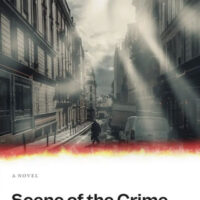
SCENE OF THE CRIME, a novel by Patrick Modianom, reviewed by Jeanne Bonner
SCENE OF THE CRIME by Patrick Modiano translated by Mark Polizzotti Yale University Press, 157 pages reviewed by Jeanne Bonner
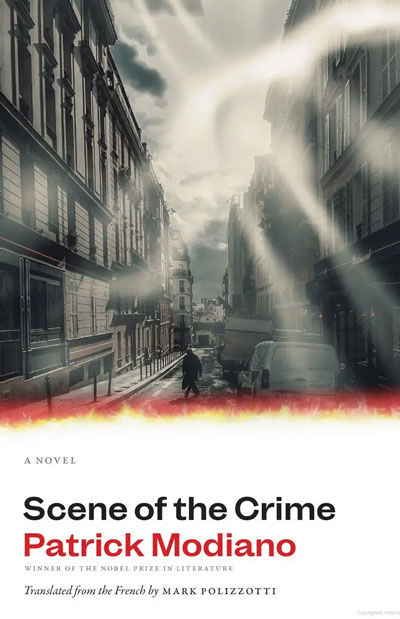 I write down all kinds of little snippets of thought because otherwise they will float away. For example, one day in the small notebook I keep in my car, I scrawled, “I think I am losing my fingerprints.” Sometimes I write as if in a trance. I must—otherwise it’s difficult to explain this command that I recorded one day: “Map my brain.” You could say it’s a call for a decoder ring of sorts, or simply my secret instructions to ...
I write down all kinds of little snippets of thought because otherwise they will float away. For example, one day in the small notebook I keep in my car, I scrawled, “I think I am losing my fingerprints.” Sometimes I write as if in a trance. I must—otherwise it’s difficult to explain this command that I recorded one day: “Map my brain.” You could say it’s a call for a decoder ring of sorts, or simply my secret instructions to ...
A MOUNTAIN TO THE NORTH, A LAKE TO THE SOUTH, PATHS TO THE WEST, A RIVER TO THE EAST, a novel by László Krasznahorkai, reviewed by Dylan Cook
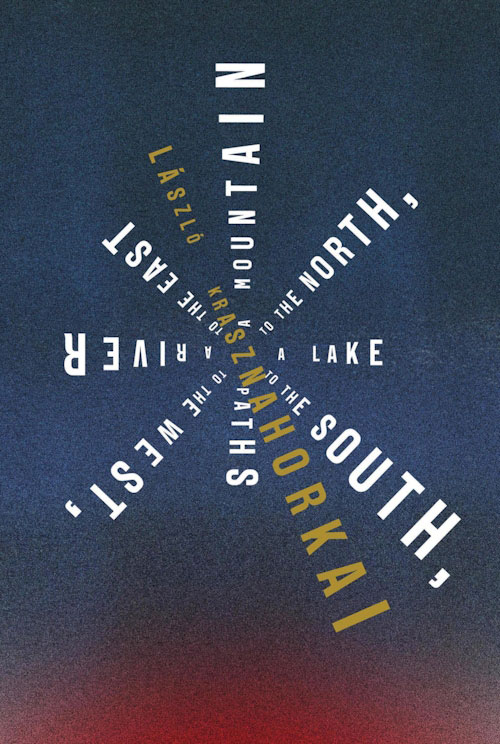 A MOUNTAIN TO THE NORTH, A LAKE TO THE SOUTH, PATHS TO THE WEST, A RIVER TO THE EAST by László Krasznahorkai translated by Ottilie Mulzet New Directions, 144 pages reviewed by Dylan Cook It would be fair to say that there’s only one real, human character in A Mountain to the North, but even that feels generous. The grandson of Prince Genji, as he’s referred to throughout the novella, isn’t substantial enough to have his own name. He wears a kimono and geta, he gets motion sickness, and he loves gardens. He isn’t very notable, but he ...
A MOUNTAIN TO THE NORTH, A LAKE TO THE SOUTH, PATHS TO THE WEST, A RIVER TO THE EAST by László Krasznahorkai translated by Ottilie Mulzet New Directions, 144 pages reviewed by Dylan Cook It would be fair to say that there’s only one real, human character in A Mountain to the North, but even that feels generous. The grandson of Prince Genji, as he’s referred to throughout the novella, isn’t substantial enough to have his own name. He wears a kimono and geta, he gets motion sickness, and he loves gardens. He isn’t very notable, but he ...
TOO MUCH OF LIFE: THE COMPLETE CRÔNICAS, essays by Clarice Lispector, reviewed by Dylan Cook
 TOO MUCH OF LIFE: THE COMPLETE CRÔNICAS by Clarice Lispector translated by Margaret Jull Costa and Robin Patterson New Directions, 864 pages reviewed by Dylan Cook
TOO MUCH OF LIFE: THE COMPLETE CRÔNICAS by Clarice Lispector translated by Margaret Jull Costa and Robin Patterson New Directions, 864 pages reviewed by Dylan Cook
A note of caution about Too Much of Life: reading it may cause you to question your reality. When Clarice Lispector took up her crônica column in 1967, she refused to give readers half-hearted, surface-level observations. Each crônica lets us see the world as Lispector saw it, and, under that microscopic magnification, even the most commonplace things become unfamiliar. Who are we when we’re asleep? Why do we lie? What’s the difference between “person” ...
GOLD by Rumi translated by Haleh Liza Gafori, reviewed by Dylan Cook
GOLD by Rumi translated by Haleh Liza Gafori New York Review Books, 112 pages
reviewed by Dylan Cook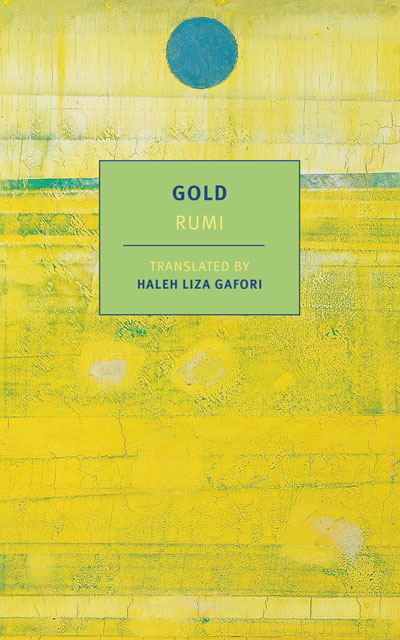 There’s no way to talk about Gold without sounding like a flower child spreading the gospel of peace and love, but is that such a bad thing? Love, after all, is the thing that brings us into this world, ties us together, and makes the days pass more pleasantly. Don’t we love to live and live to love? And aren’t all the best songs love songs? Yet, offering up love as a balm to life’s problems feels cheap. We’re often skeptical, understandably ...
There’s no way to talk about Gold without sounding like a flower child spreading the gospel of peace and love, but is that such a bad thing? Love, after all, is the thing that brings us into this world, ties us together, and makes the days pass more pleasantly. Don’t we love to live and live to love? And aren’t all the best songs love songs? Yet, offering up love as a balm to life’s problems feels cheap. We’re often skeptical, understandably ...
PHOTOTAXIS, a novel by Olivia Tapiero, reviewed by Dylan Cook
PHOTOTAXIS by Olivia Tapiero translated by Kit Schluter Nightboat Books, 128 pages reviewed by Dylan Cook
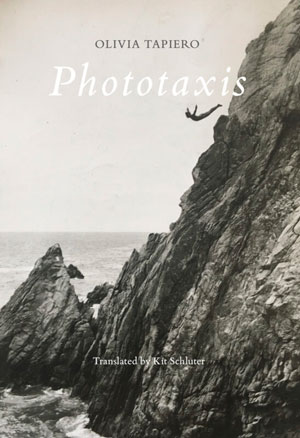 There’s something refreshingly laid-back about Olivia Tapiero’s take on apocalyptic fiction. Most novels in the genre come off a bit preachy, warning us page after page that X, Y, and Z will be our downfall. Perhaps even more grating, they go through the trouble of explaining exactly how it will end, as if we can be certain of that from our pre-apocalyptic world. Tapiero looks at these conventions and casually walks past them. In Phototaxis, the end of the world makes very little ...
There’s something refreshingly laid-back about Olivia Tapiero’s take on apocalyptic fiction. Most novels in the genre come off a bit preachy, warning us page after page that X, Y, and Z will be our downfall. Perhaps even more grating, they go through the trouble of explaining exactly how it will end, as if we can be certain of that from our pre-apocalyptic world. Tapiero looks at these conventions and casually walks past them. In Phototaxis, the end of the world makes very little ...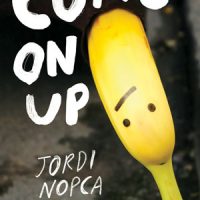
COME ON UP, short stories by Jordi Nopca, reviewed by Michael McCarthy
COME ON UP by Jordi Nopca translated by Mara Faye Lethem Bellevue Literary Press, 224 pages reviewed by Michael McCarthy
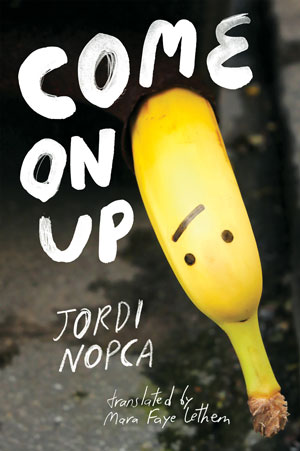 At first, it’s a promise. Come on up! It’s a pledge made to every up-and-comer in Barcelona. The city provides a backdrop for Jordi Nopca’s short story collection Come On Up, translated from Catalan to English by Mara Faye Lethem. His stories skillfully traverse decadence and depravity, splendor and squalor, the tragic and the comic, the boring and the absurd. They will resonate with anyone who has a decent job, a decent home, and decent career prospects but is still ...
At first, it’s a promise. Come on up! It’s a pledge made to every up-and-comer in Barcelona. The city provides a backdrop for Jordi Nopca’s short story collection Come On Up, translated from Catalan to English by Mara Faye Lethem. His stories skillfully traverse decadence and depravity, splendor and squalor, the tragic and the comic, the boring and the absurd. They will resonate with anyone who has a decent job, a decent home, and decent career prospects but is still ...
GARDEN BY THE SEA, a novel by Mercè Rodoreda, reviewed by Anthony Cardellini
GARDEN BY THE SEA by Mercè Rodoreda translated by Martha Tennent and Maruxa Relaño Open Letter Books, 203 pages reviewed by Anthony Cardellini
 When I began my part-time job at a botanical garden in the fall of 2017, I had next to zero gardening experience, and I knew little about the different flowers and trees that grow in the Piedmont region of North Carolina. I showed up that first day completely unprepared, without so much as a pair of gloves. But I was lucky enough to be mentored by David, a man in his early thirties from Maine, who’d been ...
When I began my part-time job at a botanical garden in the fall of 2017, I had next to zero gardening experience, and I knew little about the different flowers and trees that grow in the Piedmont region of North Carolina. I showed up that first day completely unprepared, without so much as a pair of gloves. But I was lucky enough to be mentored by David, a man in his early thirties from Maine, who’d been ...
Cockfight, stories by María Fernanda Ampuero, reviewed by Ashley Hajimirsadeghi
Cockfight by María Fernanda Ampuero translated by Frances Riddle Feminist Press, 128 pages reviewed by Ashley Hajimirsadeghi
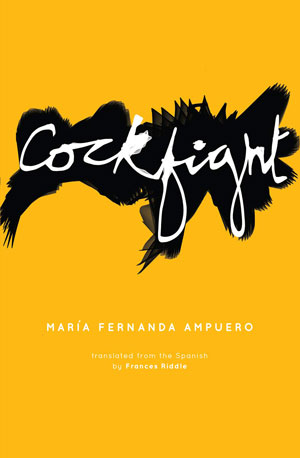 In her debut novel, Ecuadorian writer and journalist María Fernanda Ampuero takes an unflinching and intimate look into the turbulent homes and lives of Latin American women. By placing her powerful, moving stories in settings like violent domestic households or lower income neighborhoods, the characters in Ampuero’s Cockfight combat their situations with acts of bravery, loss, and love. As the characters seem to suffocate in their environments, there are acts of bravery, loss, and love. The idea of a happy family ...
In her debut novel, Ecuadorian writer and journalist María Fernanda Ampuero takes an unflinching and intimate look into the turbulent homes and lives of Latin American women. By placing her powerful, moving stories in settings like violent domestic households or lower income neighborhoods, the characters in Ampuero’s Cockfight combat their situations with acts of bravery, loss, and love. As the characters seem to suffocate in their environments, there are acts of bravery, loss, and love. The idea of a happy family ...
MINOR DETAIL, a novel by Adania Shibli, translated by Elisabeth Jaquette and reviewed by Dylan Cook
Tables need at least three legs to stand; guitar strings only ring when taut around two points. Minor Detail, Adania Shibli’s third novel, takes its title as a challenge: how much can hinge upon one moment? How can a single moment of pain bridge the past to the present? ...

INCIDENTAL INVENTIONS, short pieces by Elena Ferrante, reviewed by David Grandouiller
Who is the Italian novelist we call Elena Ferrante? Since her first novel’s publication in 1992, she—with the help of her publishers—has carefully maintained the real author’s anonymity. Many readers have treated this guarded privacy as a playful challenge, making theories and guesses, particularly in recent years as Ferrante has become increasingly celebrated. The Italian philologist Marco Santagata, after analyzing her oeuvre, suggested she might be the writer Marcella Marmo (Marmo and her publisher denied this). More controversially, the journalist Claudio Gatti dug up financial records to claim that Anita Raja is the author behind Ferrante—others suggest it may be ...

THE GREATEST LANDSCAPE HE HAD EVER SEEN by César Valdebenito, translated by Toshiya Kamei
César Valdebenito, translated by Toshiya Kamei
THE GREATEST LANDSCAPE HE HAD EVER SEEN
In the summer midday, he was seated on a blanket in his underwear, with his boots on. His horse was five or six meters away while his gaunt dog Toby was asleep. He had turned on the radio and was listening to the news, but twenty minutes later he got bored. About fifty meters away his flock of sheep wandered. Robust, peaceful, and healthy, they kept grazing. He grabbed his rifle, which he had brought back from Pueblo Seco, Mexico a few years earlier. He had always ...
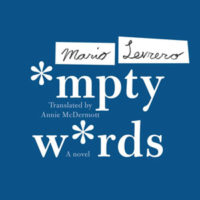
EMPTY WORDS, a novel by Mario Levrero, reviewed by Ashlee Paxton-Turner
Organized as a series of handwriting exercises, Empty Words offers a look inside a novelist’s mind as he attempts to improve himself by improving his handwriting. Originally published in 1996 in Spanish, it is Levrero’s first novel translated into English. Annie McDermott, who introduces English language readers to Levrero, has translated other works from Spanish and Portuguese, and her translations have appeared in many places, including Granta, the White Review, Asymptote, Two Lines, and World Literature Today ...

THE WAY THROUGH THE WOODS: ON MUSHROOMS AND MOURNING, a memoir by Long Litt Woon, reviewed by Beth Kephart
I bought Long Litt Woon’s The Way Through the Woods: On Mushrooms and Mourning for the promise embedded in the premise. How would Woon make her way back into the world after the shocking, sudden death of the fifty-four-year-old husband with whom she had spent all her adult years? What do mushrooms have to do with recovering from such a loss? Does anybody ever actually recover? ...

MAX HAVELAAR: OR, THE COFFEE AUCTIONS OF THE DUTCH TRADING COMPAN, a novel by Multatuli, reviewed by Dylan Cook
Max Havelaar is likely an unfamiliar title to most American readers, and the Netherlands in general is an often overlooked source of literature. But make no mistake: the world over holds Max Havelaar in high regard. I recently had the chance to talk to a born-and-raised Dutchman, and I asked him if the title rang any bells. "Of course," he told me. "It's a classic, everyone reads it." Think along the lines of Pride and Prejudice. In his short but poignant introduction to this edition of the novel, Indonesian author Pramoedya Ananta Toer makes the bold claim that Max Havelaar ...

BERLIN ALEXANDERPLATZ, a novel by Alfred Döblin, reviewed by Tyson Duffy
A thought experiment: imagine that back during the peak prosperity years of the Obama Administration, with optimism at a high and unemployment dropping, that the good Dr. Oliver Sacks had unexpectedly published a despairing novel featuring a one-armed murdering pimp with white-supremacist leanings named Frank Beaverbrains. This dull petty criminal wanders Manhattan—or some gentrifying urban center of high culture and national pride—selling tie stands and alt-right newsletters, roughing up prostitutes, shooting up bars, and volunteering for a number of disastrous heists before winding up a diminished nobody, an assistant porter at a small company with less than nothing left to ...
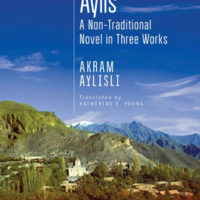
FAREWELL, AYLIS: A NON-TRADITIONAL NOVEL IN THREE WORKS by Akram Aylisl, translated by Katherine E. Young, reviewed by Ryan K. Strader
We don’t often read literature from Azerbaijan, for many reasons. It’s a small post-Soviet country that is hard to find on the map, with a Turkic language that makes finding translators difficult, and a government that still censors its writers Soviet-style. We don’t generally stroll down the aisle at a bookstore and discover the “Azeri” section. The only thing harder to find might be Georgian, and I’ll only say “might.” Probably most of us have no idea what novelists in Azerbaijan write about, what kind of social justice concerns they have, or what kind of risks those writers take to ...
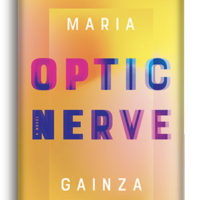
OPTIC NERVE, a novel by Maria Gainza, translated by Thomas Bunstead, reviewed by Justin Goodman
Written from the perspective of an unnamed Argentinian art critic, Optic Nerve flits from her present to her childhood memories, to her culture’s memories, in order to develop a lineage between self and cultural artifacts, become an optic nerve transmitting information from the external to the internal. The most representative instance of this transmission takes the form of a historical moment remembered by the narrator: while Señora Alvear, “once upon a time the famous soprano Regina Pacini,” sits at her dinner table beneath a painting by French animal painter Alfred de Dreux, “her eye travels back and forth constantly between ...

ALL FOR NOTHING, a novel by Walter Kempowski, reviewed by Tyson Duffy
Every self-professed American optimist should read the oeuvre of Walter Kempowski—not that they ever will. The chronicler of brutality was never given a fair shake even by his fellow Germans, and despite strong book sales, by literary award committees. Kempowski had plenty of reasons to be angry—angry at his Nazi father whom he betrayed, at what the agonized Sebastian Haffner once called the “moral inadequacy of the German character,” at the literary world for snubbing him, and at every center of power involved in WWII: the Russians, British, Germans, Europe itself. The triumphant Soviets—without whom WWII could not have been ...
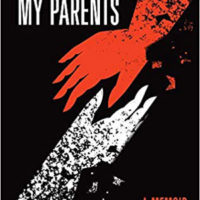
ADIÓS TO MY PARENTS, a novel by Héctor Aguilar Camín, reviewed by Kim Livingston
Adiós To My Parents is a universal family story. Although the setting (Mexico, Belize, Guatemala) is unfamiliar to me—I’ve lived in the Chicago suburbs all of my fifty-one years and, regrettably, have taken only one Spanish class—the people in this book are so richly drawn that I know them instantly ...
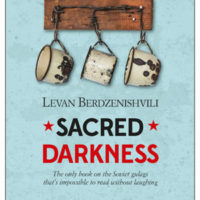
SACRED DARKNESS: THE LAST DAYS OF THE GULAG, a narrative by Levan Berdzenishvili, reviewed by Ryan K. Strader
“As with any book, my book had its own special fate—it was born by mistake,” claims Levan Berdzenishvili, in the opening chapter of Sacred Darkness. Levan wakes up in a hospital, sick and disoriented, with a high fever. He realizes he has some debts to pay before he can jaunt off to Hades. Levan is a specialist in Greek literature, so he doesn’t talk of “dying.” He refers to “my departure to Hades.” ...
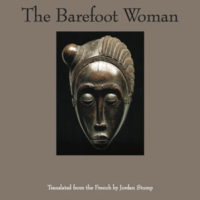
THE BAREFOOT WOMAN, a novel by by Scholastique Mukasonga, reviewed by Rebecca Entel
The Barefoot Woman opens with the author’s mother, Stefania, imparting knowledge to her daughters. “Often in the middle of one of those never-ending chores that fill a woman’s day,” Mukasonga writes, “(sweeping the yard, shelling and sorting beans, weeding the sorghum patch, tilling the soil, digging sweet potatoes, peeling and cooking bananas…), my mother would pause and call out to us.” Much of the book proceeds from this image: we learn the details of her mother’s life and rituals through her endless work and we learn the kinds of things passed down from a Tutsi mother to her daughter—one of ...
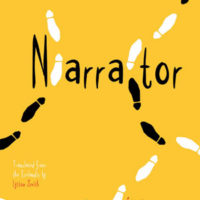
NARRATOR, a novel by Bragi Ólafsson, reviewed by Katharine Coldiron
Narrator is brief and quirky, rich and absurd, metatextual and extremely simple. It’s a walking narrative (in reality, a stalking narrative), which means it depends upon the motion of the narrator in order to go anywhere in particular. However, this book’s range is only within the mind; Aron’s and G.’s movements throughout Reykjavik are completely uninteresting, encompassing mostly pubs and shops of little consequence. But G.’s thoughts circle neurotically around his family, his failures, and Aron’s ex-girlfriend, Sara, for whom G. pined. In this way, and others, the vertical dimensions of the book are much more compelling than its movements ...

THE FEMALES by Wolfgang Hilbig reviewed by Ryan K. Strader
The Females was my first encounter with the late writer Wolfgang Hilbig, who grew up in East Germany and was allowed to move to the West in the mid-80s. He died in 2007 and was buried in Berlin. Isabel Fargo Cole has been translating his work for twenty years now. She started working to gain Hilbig an English-speaking audience before his death, and The Females, from Two Lines Press, is her sixth Hilbig work. ...
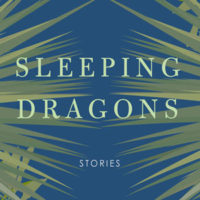
SLEEPING DRAGONS, stories by Magela Baudoin, reviewed by Katharine Coldiron
Thank goodness Magela Baudoin’s first book to be translated in English, Sleeping Dragons, is so short. The fifteen stories in this collection (adding up to only 140 pages) are so precise, bursting with such potency, that to increase the collection to 200 or 250 pages would just about kill the average reader. Nearly all the stories are perfectly formed, energetic little spheres—like new tennis balls, popping with their own elasticity the moment they drop out of the canister—and only so many of these spheres can hit a reader between the eyes before she must stop, dazed. The overall impression is ...
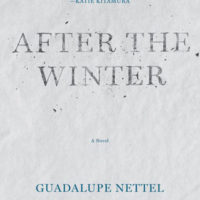
AFTER THE WINTER, a novel by Guadalupe Nettel, translated by Rosalind Harvey, reviewed by Robert Sorrell
At the beginning of Guadalupe Nettel’s newly translated novel After the Winter, twenty-five-year-old Cecilia moves from her native Oaxaca to Paris. She arrives there without the usual image of Paris as a “city where dozens of couples of all ages kissed each other in parks and on the platforms of the métro, but of a rainy place where people read Cioran and La Rochefoucauld while, their lips pursed and preoccupied, they sipped coffee with no milk and no sugar.” ...

STRANGE WEATHER IN TOKYO, a novel by Hiromi Kawakami, reviewed by August Thompson
The motor of Strange Weather is the slow love that builds between Tsukiko and Sensei. At a neighborhood bar, they run into each other after decades of absence. Maybe at another time they would have exchanged pleasantries and moved along. But they are both living in the same kind of underwater blue. They chat and find that their language is the same. They start to build an intimacy without schedule, running into each other at the bar, sharing meals and drinks, telling simple stories, laughing at their inconsistencies ...

HORSEMEN OF THE SANDS, two novellas by Leonid Yuzefovich, reviewed by Ryan K. Strader
The translation initiative Read Russia characterizes Leonid Yuzefovich as a writer whose books “gray the lines between faction and fiction,” using historical figures and settings in his work. “Faction” is for artful historians (or for historian artists, perhaps), writers who know how to be suspicious of fictionalizing, but also know that history is never just facts. This description of Yuzefovich makes sense, since he is a historian by training and taught history for many years, but has emerged as an influential contemporary fiction writer in Russia ...
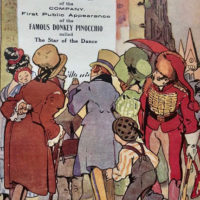
THE ADVENTURES OF PINOCCHIO, a novel by Carlo Collodi, reviewed by Beth Kephart
If Disney’s Pinocchio is an affable, pliable ingénue who was reconfigured, according to the lore, to look more like a boy than a puppet, Collodi’s is an anti-hero—a wooden thing with barely any ears who mostly can’t see beyond his own nose, no matter its current proportion. He is persistent, insistent, impossible, exasperating, willfully obtuse, a regular screw-up. You don’t have to stretch to note the parallels that dominate our news cycle. Donald J. Trump was prefigured more than 130 years ago. He was augured by a satirist who was most supremely skilled in imagining poor, and poorly curbed, behavior ...
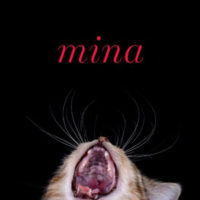
MINA, a novel by Kim Sagwa, reviewed by Kelly Doyle
A new novel, Mina, written by Kim Sagwa and translated from Korean by Bruce and Ju-Chan Fulton, attempts to chronical adolescences, a transformative time of life, but in the context of a world that does not condone individuality, experimentation, or choice. Through unconventional characters, a high-pressure setting, and an unapologetic directness that is both off-putting and enthralling, Kim creates an entirely different kind of teenage drama. By placing three emotional, confused young people in a world of restraint and hidden suffering, she ignites an explosion of a story that is entirely new. It does not have the charming humor of ...
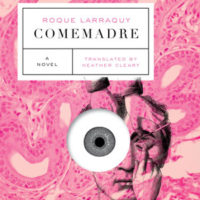
COMEMADRE, a novel by Roque Larraquy, reviewed by Justin Goodman
There is a plant “whose sap produces […] microscopic animal larvae” that can consume rats “from the inside out.” It can only be found on “Thompson Island, a small landmass in Tierra Del Fuego,” within Argentinian screenwriter Roque Larraquy’s debut novel Comemadre—the name of this plant of spontaneous generation. Translated in the novel as “motherseeker or mothersicken,” this fictitious plant and its larvae symbolize the dual powers of violence to create and destroy. First as crime, then as art ...

KATALIN STREET, a novel by Magda Szabó, reviewed by William Morris
Four children play together in a quiet neighborhood. The children are Henriette Held, the young daughter of a Jewish dentist; the Elekes sisters, Irén and Blanka; and Bálint Temes, the handsome son of the Major. Their game is Cherry Tree, in which they all sing and spin in circles, and one of the children “chooses” another, the one they love. In this innocent game, the girls invariably choose Bálint, and each girl develops her own particular feelings for the boy; when it is his turn to choose, though, Bálint always prefers Irén, the oldest and most serious of the three ...
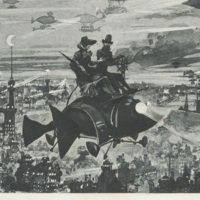
GASLIGHT: Lantern Slides from the Nineteenth Century, essays by Joachim Kalka, reviewed by Katharine Coldiron
With a title and subtitle like Gaslight: Lantern Slides from the Nineteenth Century, the reader will be forgiven for thinking Joachim Kalka’s book is a collection of visual art. It is not. Though it does contain a handful of visual descriptions, it bears not one illustration, woodcut, or photograph. No lantern slides, and no visual depictions of gaslight. What it has instead are words, many of them, artfully arranged. Kalka’s words, assembled into eleven essays and a preface, are densely packed and remarkably pointed. Although his purpose is to glance back at the nineteenth century, not to historicize it, or ...
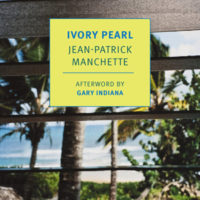
IVORY PEARL, a novel by Jean-Patrick Manchette, reviewed by Ryan K. Strader
Ivory Pearl is Jean-Patrick Manchette’s final and unfinished novel, now available in an English translation by Donald Nicholson-Smith. Manchette was known during his lifetime for his 1970s crime novels, noir that gained popular movie adaptations and made him a standard among French crime writers. This translation features endnotes on how Manchette envisioned the novel ending, and an introduction written by Manchette’s son, Doug Headline, which is as affectionate as it is informative ...

TRICK by Domenico Starnone, translated from the Italian by Jhumpa Lahiri, reviewed by Jeanne Bonner
The work of literary translators can be viewed as vital, especially given the forces of nationalism today, so it is no small matter that someone of Lahiri’s caliber has joined the ranks. For Starnone and his readers, it means his novel Trick arrives in English in mesmerizing form ...

ADUA, a novel by Igiaba Scego, reviewed by Jodi Monster
The title character of Igiaba Scego’s novel Adua is a Somali woman caught in history’s crosshairs. Born to an ambitious, mercurial man, a translator who sold his skills to the Italians during Mussolini’s pre-WWII push to expand his African empire, Adua's life is shaped by choices she didn’t make and subject to forces she can’t control ...

TOMB SONG, a novel by Julián Herbert, reviewed by Katharine Coldiron
What an odd book Tomb Song is. It contains prose both beautiful and profane, extensive self-awareness and a troubling level of self-ignorance. Its author and its narrator blur together into an entity that is never quite one or the other, and it doesn’t distinguish between fiction and nonfiction with especial meticulousness. That is, the narrator and the author have the same name, the same wife and child, the same job, and the same literary accomplishments. It remains undefined whether, in what passages, and to what extent Herbert has fictionalized his life to write this book, which a reviewer in a ...
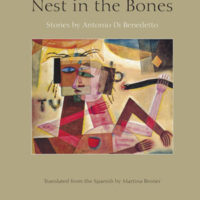
NEST IN THE BONES: STORIES by Antonio Di Benedetto reviewed by Eric Andrew Newman
This collection showcases a number of wonderfully imaginative stories whose fanciful imagery remains in the reader’s mind long after he’s finished reading. Di Benedetto’s concise, intelligent stories are surely still a source of complicit delight. Anyone who reads Zama and is hungry for more of Di Benedetto’s work will enjoy pecking at the writer’s brain in Nest in the Bones ...
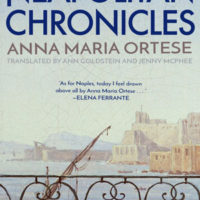
NEAPOLITAN CHRONICLES, stories and essays, by Anna Maria Ortese reviewed by Jeanne Bonner
Any book that has a ringing endorsement on its cover from Elena Ferrante these days will merit a second look. But there is another, potentially more important endorsement of Neapolitan Chronicles—a silent endorsement on the part of the translators of this Italian story collection by Anna Maria Ortese, originally published in Italy in 1953 ...
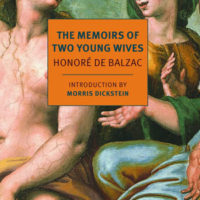
The Memoirs of Two Young Wives, a novel by Honoré de Balzac, translated by Jordan Stump, reviewed by Ashlee Paxton-Turner
The classic coming-of-age novel tells the story of a young boy coming to terms with the man he is about to become. Over 175 years ago, the great French literary seer Honoré de Balzac composed a rather untraditional version: in his novel, The Memoirs of Two Young Wives, Balzac applies the traditional arc of the bildungsroman to two female protagonists in order to present two ways of life—the passionate life and the tranquil life. In doing so, Balzac reminds readers of the elusive nature of happiness, regardless of one’s way of life, and what it means to love and be ...
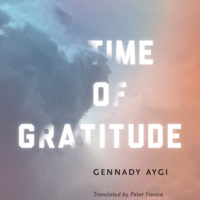
TIME OF GRATITUDE, essays and poems by Gennady Aygi, reviewed by Ryan K. Strader
Time of Gratitude is an unusual text: the collected pieces are both prose and poetry, some of them written for events and some written as personal reflection. Translator Peter France has organized the book into two sections. The first one is devoted to Russian and Chuvash writers and artists, including Boris Pasternak, Kazimir Malevich, Varlam Shalamov, and Chuvash poet Mikhail Sespel ...
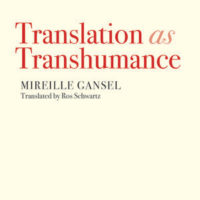
TRANSLATION AS TRANSHUMANCE, a book-length essay by Mireille Gansel, reviewed by Rachel R. Taube
For Mireille Gansel, the work of translation is an all-consuming task. Before embarking on a project, Gansel first immerses herself in the world of the poet she is translating. She studies the historical context of their writing as well as the personal context. Wherever possible, she engages with their physical environment: she visits their home, observes their writing space. And, ideally, she listens to the poet read their work aloud. Attempting to translate a single German word, “sensible,” in a poem by Reiner Kunze, Gansel travels from West to East Germany to “[listen] to the poet read, alert to his ...

MIRROR, SHOULDER, SIGNAL, a novel by Dorthe Nors, reviewed by Brendan McCourt
Above all else, Mirror, Shoulder, Signal is a novelist’s novel. Literary-minded readers will revel in the novel’s allegorical framework extending anywhere from cautionary tale to failed bildungsroman to a metaphor of novel reading itself ...
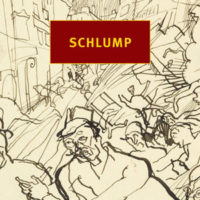
SCHLUMP, a novel by Hans Herbert Grimm, reviewed by Kelly Doyle
When Hans Herbert Grimm’s semi-autobiographical novel Schlump was published in 1928 alongside All Quiet on the Western Front, it was advertised as a “truthful depiction” of World War I. It is no surprise that Grimm took on the the pseudonym Schlump, just as his protagonist does, to hide his identity. As explained by Volker Weidermann in the afterward, Grimm “describe[s] the German soldiers of the Great War as less than heroic,” and “the entire war as a cruel, bad joke.” While this caused the Nazis to burn his book in 1933, today it gives the text, translated by Jamie Bulloch, ...
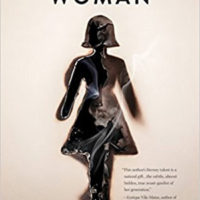
A WORKING WOMAN, a novel by Elvira Navarro, reviewed by Melanie Erspamer
“She wanted […] the location of her madness to be now the location of her art.” This is how the narrator of The Working Woman analyzes her roommate, but the same can be said of the narrator herself, and perhaps as well of the only figure in this postmodernist novel who actually “speaks:” the author, Elvira Navarro. The text becomes the conjunction of madness and art, which share one abstract and yet delineated “location,” madness needing expression through art, or art uniquely poised to express madness ...
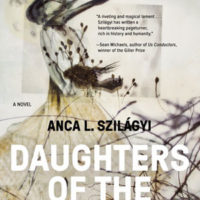
DAUGHTERS OF THE AIR, a novel by Anca L. Szilágyi, reviewed by Leena Soman
Tatiana is supposed to spend the summer before her junior year in high school in Vermont with her only friend while her mother summers in Rome. Instead, she hitches a ride from her boarding school’s Connecticut campus to Brooklyn. It’s 1980, and Tatiana renames herself Pluta, an alter ego she has long cultivated to meet the demands of this adventure. So begins Anca L. Szilágyi’s debut novel Daughters of the Air ...
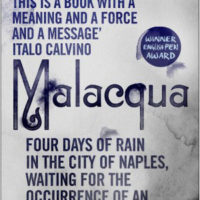
MALACQUA, a novel by Nicola Pugliese, reviewed by Robert Sorrell
Anyone who picks up And Other Stories’ edition of Malacqua, the first English translation of Nicola Pugliese’s Italian novel from 1977, will be immediately alerted to the strange weather which serves as the novel’s catalyst. Emblazoned across the book’s cover is Malacqua’s unofficial subtitle: Four Days of Rain in the City of Naples, Waiting for the Occurrence of an Extraordinary Event. Before even opening the book, the reader is clued into Pugliese’s supreme fascinations: water and Naples. And of course, the collision of the two ...
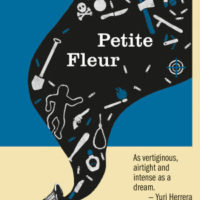
PETITE FLEUR, a novel by Iosi Havilio, reviewed by August Thompson
Iosi Havilio’s Petite Fleur is a great book because it is a work of surprises intimately knotted around each other. The plot twists and writhes. Murders and magic lead to diatribes about jazz fusion that leads to rebirth and love and examinations of the anxiety of parenthood and marriage. The unexpected is constant, the satisfaction complete ...
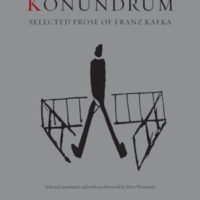
KONUNDRUM: SELECTED PROSE OF FRANZ KAFKA by Franz Kafka reviewed by Eric Andrew Newman
With the centenary of Franz Kafka’s first three major publications having passed just a few years ago, a plethora of new translations of Kafka’s stories have recently been released. Among them is Konundrum: Selected Prose of Franz Kafka, with works chosen and translated by Peter Wortsman, a writer known for his own micro fiction. Wortsman’s selection of what he considers to be the very best of Kafka’s short prose, whether it’s a story, a letter, a journal entry, a parable, or an aphorism distinguishes Konundrum from the other new translations. This approach contrasts with the single book-length work of Susan ...

ALL THAT MAN IS, a novel by David Szalay, reviewed by Ryan K. Strader
In an interview with NPR, David Szalay pointed out that the title of his novel, All that Man Is, can be read two different ways: “either as a sort of slightly disparaging, sort of all that man is, and this is it. Or it can be read as a sort of almost celebratory—everything, all the kind of great variety of experience that life contains.” Szalay seems to see his work as falling somewhere in between, not entirely “disparaging” nor precisely “celebratory,” since it is a study of men dealing with situations of personal crisis. While many reviewers have described All ...

THE MADELEINE PROJECT, a work of creative nonfiction by Clara Beaudoux, reviewed by Ryan K. Strader
In 2013, a young journalist named Clara Beaudoux moves into a Paris apartment. The previous tenant, a woman named Madeleine, lived there for 20 years before passing away in her nineties. Strangely, Madeleine’s things have not been removed from the cellar. “All I had to do was open a door, the door to my cellar, for the adventure to begin,” writes Beaudoux ...

